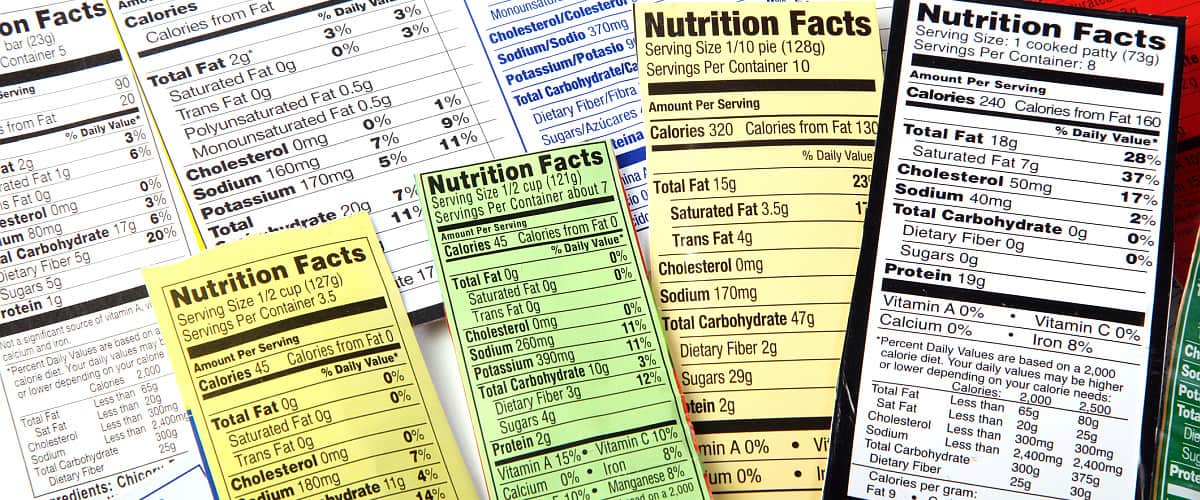We live in a world brimming with choices about what and how to eat. New products appear on shelves and new diets gain popularity all the time. Along the way, specific foods and eating patterns have developed some pretty good (or bad) reputations. But not everything you hear or read about food and nutrition is true or provides all the facts.
How are you to make sense of it all? We tapped Aramark Dietitian Qiong Chen, who is a Doctor of Physiology in Nutrition, to help debunk nine common food and nutrition myths.
Myth #1: Coconut oil is a healthy oil with benefits ranging from weight loss to lowering blood sugar.

Qiong Chen, PhD, RDN
The Truth: Coconut oil contains over 80% saturated fat — a nutrient the American Heart Association (AHA) recommends limiting for best heart health and overall health.
Did You Know? Coconut oil has been shown to increase both low-density lipoprotein (LDL) blood cholesterol (the “bad” kind) and high-density lipoprotein (HDL) blood cholesterol (the “good” kind) more than other plant-based oils. So it’s really a mixed bag!
The Recommendation: For your everyday cooking needs, turn to other liquid oils like canola, olive, and avocado. Also, keep an eye on how much saturated fat you eat and replace it with sources of healthy unsaturated fats. Think nuts and seeds, as well as those same olives and avocados when possible. More broadly, says Dr. Chen, “Don’t expect that any single food will do wonders for your health. It’s your overall diet that matters.”
Myth #2: Eggs are bad for you because they are high in cholesterol.
The Truth: According to the AHA, most healthy people can eat one egg per day without increasing their risk of heart disease. And eggs pack a nutritional punch. They are a good source of protein plus vitamins A, B12, and D.
Did You Know? Research has shown that cholesterol from food doesn’t have as much impact on our blood cholesterol levels as the saturated fat in our diets.
The Recommendation: Eggs have a lot going for them! They are nutritious, convenient, and versatile enough to serve for any meal or snack. “How you cook your eggs and what you eat with your eggs also matters,” Dr. Chen reminds us. “For example, a hard-boiled egg on top of a bed of salad is a better choice compared to fried eggs with bacon or sausage.” As with anything, moderation is key.
Myth #3: Coffee and tea can dehydrate you because they contain caffeine.
 The Truth: Coffee and tea are mostly water, so they can be just as hydrating as water when consumed in moderation. And that boost of caffeine may even help you stay focused!
The Truth: Coffee and tea are mostly water, so they can be just as hydrating as water when consumed in moderation. And that boost of caffeine may even help you stay focused!
Did You Know? According to the FDA, it is generally safe for healthy adults to consume up to 400 mg of caffeine daily, which is about four cups of coffee. A cup of tea contains about half as much caffeine as the same amount of coffee. You’ll also find caffeine in chocolate, energy drinks, and some sodas.
The Recommendation: When you’re in need of hydration, regular water is almost always the way to go. But caffeinated drinks like coffee and tea can also help get the job done. “Just be mindful of your total caffeine intake, as well as the added sugar that often comes with those beverages,” Dr. Chen cautions. (More on sugar below.)
Myth #4: Juice cleanses are healthy because they detox your body and help with weight loss.
The Truth: Exclusively consuming juice (or any other food or beverage) for an extended time—as a method of detoxing—is not recommended for most healthy people. Actually, these kinds of detoxes aren’t advisable because your liver and kidney already do such a great job removing toxins from your system every day. Juice cleanses are also not a great weight loss strategy. Although some people may lose weight initially, it’s likely due to the fact that they’re eating fewer calories. However, it is not a healthy or sustainable approach to losing weight or maintaining a healthy weight.
Did You Know? Juicing extracts the fluid from fruits and vegetables, which retains some important nutrients. However, in the process you’ll lose much of their fiber, which is key for digestive health and helps you feel full. Most fruit juices are also very high in sugar. Smoothies are a good alternative to juices because they blend whole ingredients together, keeping all the nutrients intact. In addition to fruits and vegetables, common smoothie ingredients include dairy (in the form of milk or yogurt), plant-based milks, nut butters, spices, and herbs.
The Recommendation: “Eat whole fruits and veggies whenever you can to get the maximum benefits,” says Dr. Chen. “However, if you are on-the-go or have difficulty eating enough or a good variety of fruits and veggies, you can easily replace a meal with a well-balanced smoothie.” Again, watch out for those added sweeteners!
Myth #5: Celery is a “negative-calorie” food.
 The Truth: There really is no such thing. Celery (and similar foods like watermelon) get this reputation because they are low in calories and high in fiber—the idea being that we burn more calories eating, digesting, and storing them than they provide. But they still contain calories.
The Truth: There really is no such thing. Celery (and similar foods like watermelon) get this reputation because they are low in calories and high in fiber—the idea being that we burn more calories eating, digesting, and storing them than they provide. But they still contain calories.
Did You Know? “If you want to get technical, only ice water qualifies as a negative-calorie food because it provides zero calories and will cost you a few calories to bring it to your body temperature,” Dr. Chen explains. “However, no one can live on just ice water!”
The Recommendation: All math aside, we don’t want to stop you from enjoying fruits and vegetables that are low in calories and high in fiber. They can help keep you full, lower your consumption of other high-calorie foods, and decrease your total calorie intake. Eat celery and watermelon to your heart’s content!
Myth #6: Sea salt is healthier than table salt because it is natural and less processed.
The Truth: Nutritionally, there is little difference between the two. Both forms of salt contain sodium, which the AHA says most healthy adults should limit to 2,300 mg per day to reduce the risk for high blood pressure and other chronic diseases.
Did You Know? Sea salt is evaporated seawater, so it may contain trace amounts of other minerals like magnesium, potassium, and calcium. Meanwhile, table salt is processed from purified underground salt deposits, meaning most other minerals will be stripped away. Iodine is often added to table salt.
The Recommendation: Whether you’re using it in a recipe or sprinkling it on top, the type of salt you choose is mostly a matter of personal preference. But be mindful of your total sodium intake—the majority of which actually comes from processed and restaurant foods. “You can easily get these minerals from other foods, so you don’t need to count on salt to meet your mineral needs,” says Dr. Chen.
Myth #7: Gluten is bad for you, so a gluten-free diet must be healthy.
The Truth: Gluten is a protein that exists in wheat, barley, and rye. “People with the autoimmune disorder celiac disease or a gluten intolerance must strictly avoid gluten,” Dr. Chen shares. “But for the rest of us, there is no reason to avoid gluten.”
Did You Know? A lot of the processed gluten-free products are high in refined sugar, saturated fat, and sodium. They can be more expensive, too.
The Recommendation: Gluten-containing grains, especially in their whole-grain form, provide fiber, vitamins, and minerals your body needs for good health. They can also help reduce your risk of several chronic diseases, as well as help you feel better and have more energy. The USDA recommends half of the grains you consume be whole grains.
Myth #8: Honey, agave, and other unrefined sugars are healthier than table sugar.
 The Truth: Sugar is sugar! Your body digests honey and agave the same way it does table sugar. All forms of sugar (maple syrup is another common example) contain calories and can raise your blood sugar.
The Truth: Sugar is sugar! Your body digests honey and agave the same way it does table sugar. All forms of sugar (maple syrup is another common example) contain calories and can raise your blood sugar.
Did You Know? The AHA recommends a daily sugar intake of less than 6 teaspoons (24 grams) for women and 9 teaspoons (36 grams) for men. Many Americans eat about two to three times the recommended amount.
The Recommendation: Limit your intake of added sugar, in all its forms. Dr. Chen advises. Naturally occurring sugars, such as those found in whole fruit, are better for you because the fiber from the fruit helps regulate blood sugar levels. There is also added nutritional value from the phytochemicals found in whole fruits.
Myth #9: Plant-based milks are a healthier option than cow’s milk.
The Truth: Not all milks are created equal. Some plant-based milks lack or are low in certain key nutrients, such as protein. At the same time, they can be high in carbohydrates, including sugar from flavorings or sweeteners. Some but not all plant-based milks are fortified with calcium and vitamin D.
Did You Know? Eating whole soybeans, oats, and almonds is preferable to drinking their milks. “When you make milk from whole foods, some of the nutrients are removed during the process,” Dr. Chen explains.
The Recommendation: While plant-based milks might not be more nutritious, they do offer important health benefits for those with dairy allergies or sensitivities. These milks can also have a lower environmental footprint than cow’s milk — or you may simply prefer the taste. The key is to choose your plant-based milk wisely. “It’s hard to beat the nutrition of nonfat, unsweetened cow’s milk. But if you are looking for an alternative, fortified unsweetened soy milk or pea milk have the closest nutrition profiles,” she says. “It’s always a good idea to check the nutrition facts label and ingredients list before purchasing. Go with plant-based milks that contain less or no added sugar.”
Insight You Can Trust
We thank Dr. Chen for giving us the true scoop on these popular food and nutrition myths. We hope this information empowers you to be a more educated shopper and consumer, as you choose the foods that will best fit your life.
For more fad-free nutrition information, check out our blog Nutrition News: Who (and What) Can You Trust?
You can count on Feed Your Potential 365 as a trusted source of insights and information! We only rely on evidence-based information for our nutrition-related blogs. Our dietitians are licensed experts that put forth the most accurate content for our followers—so you can discover what a healthy lifestyle can do for you.
Note: Since everyone’s health history and nutritional needs are so different, please make sure that you talk with your doctor and a registered dietitian to get advice about the diet and exercise plan that‘s right for you.

